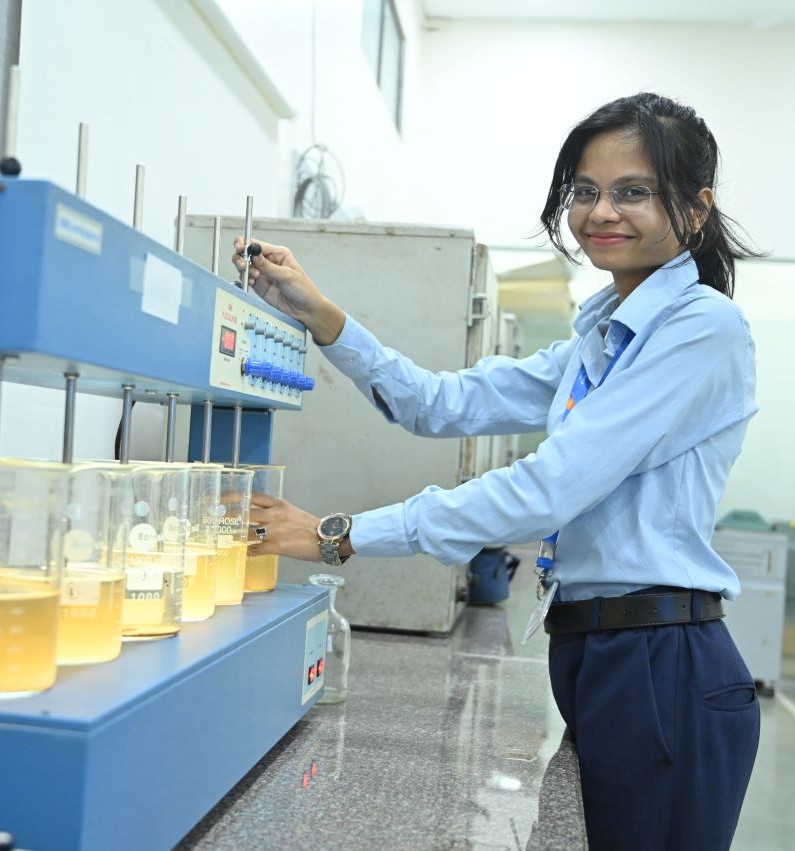M.Tech Environmental Engineering
Programme Overview
The M.Tech in Environmental Engineering programme at MIT-WPU is designed to prepare students with the advanced knowledge and latest research skills essential for tackling new-age environmental issues.
The programme emphasises sustainable usage and management of water, land, and air as renewable resources, and minimises ecological pollution while safeguarding our environment.
The curriculum incorporates the study of a wide range of subjects, including Environmental Monitoring and Modelling, Industrial Air and Water Pollution Control, and Applications of GIS and Remote Sensing.
Other than this, the students also engage in practical training via project-based learning and six-month internships, allowing them to apply theoretical concepts in real-world scenarios, learnt over the programme duration.
The M.Tech Environmental Engineering programme with its state-of-the-art facilities and experienced faculty, fosters a vibrant learning environment that prepares students for a variety of career options.
Graduates of this programme emerge as leaders capable of contributing to environmental protection efforts and sustainable development initiatives, equipped with the skills to address pressing global challenges effectively.
Major Tracks
- Environmental Statistics & Modelling
- Air Pollution and Control Technology
- Sustainability Assessment
- Environmental Risk Assessment
- Environmental Audit
Duration & Fees
Duration
2 Years
Last Date to Apply : 13 April 2026
Fee Per Year
₹ 2,25,000
Scholarship
| GATE Score | MIT-WPU Stipend per month | Workload / Teaching Assistantship in MIT-WPU |
|---|---|---|
|
Eligible General Category GATE Score for stipend as per AICTE norms |
₹ 12,500/- (For the entire duration of the programme) |
8 hours workload per week |
|
GATE Score 15 and up-to Eligible General Category cut-off |
₹ 8,000/- (For first year only) |
6 hours workload per week |
|
GATE Score 10 to 14.99 |
₹ 6,000/- (For first year only) |
4 hours workload per week |
Note:
- During Working Hours, M.Tech Students will be considered for 'on campus job' as per Policy
- Stipend will be effective only after receiving complete fees for the first year.
- In case student is receiving any government scholarship/stipend, University stipend will not be applicable.
Terms & Conditions Apply:
- During Working Hours, M.Tech Students will be considered for 'on campus job' as per Policy.
- Stipend will be effective only after receiving complete fees for the first year.
- In case a student is receiving any government scholarship/stipend, University stipend will not be applicable.
For more detailed information visit our website: https://mitwpu.edu.in/scholarships
Eligibility
Minimum 50% aggregate marks in a 4- year graduation degree in the relevant Engineering branch* from a UGCapproved institution/ university or its equivalent (Minimum 45% aggregate marks for candidates belonging to the Reserved Category from Maharashtra State).
Selection Process
Admission will be based on the merit of the MIT-WPU CET 2026 Entrance Examination, along with a Personal Interaction (PI) score conducted by MIT-WPU as per the prescribed schedule.
A valid score in GATE score (2026/ 2025/ 2024), PERA-CET 2026 will also be considered for the selection process; in such cases, the candidate must additionally appear for the Personal Interaction (PI) Score conducted by MIT-WPU as per the prescribed schedule.
For admission under sponsored category, candidate must have a minimum of two years of full-time work experience in a registered firm, company, industry, educational/ research institute, Government Department, or Government Autonomous Organization in the relevant field in which admission is sought. A Sponsorship Certificate (in the prescribed format) is mandatory for admission under this category.
* For more information regarding programme-wise branch eligibility, please refer to the M.Tech. rules published on the official website.
Programme Highlights
- The programme offers a robust curriculum that covers essential topics such as Environmental Monitoring and Modelling, Industrial Air and Water Pollution Control, and the Applications of GIS and Remote Sensing, ensuring an overall education in environmental engineering.
- Students can upgrade their education by choosing from a variety of electives, including Advanced Concrete Technology, Solid Waste Management, and Environmental Audit, allowing them to focus on niche areas of interest.
- The programme ensures project-based learning that includes six-month industry internships, providing students with the practical experience needed for real-world settings.
- Students of this programme benefit from industry-driven research and practical training, encouraging an environment of innovation and skill development. Industry Collaborations with leading companies such as Tata Technologies and Mercedes Benz, through guest lectures, workshops, and seminars by experts, facilitate exposure to industry practices.
- The dedicated Centre for Industry-Academia Partnerships (CIAP) ensures strong placement support for students in receiving comprehensive support for internships and job placements, backed by a robust global alumni network.
Career Prospects
Environmental Consultant
Water Resource Manager
Sustainability Specialist
Research Scientist
Assistant Professor
Project Engineer
Programme Outcomes
- Graduates gain an advanced problem-solving mindset that helps them analyse complex environmental engineering challenges and apply innovative solutions to resolve them.
- Students gain research proficiency to employ appropriate research methodologies and tools to extract relevant information, and to analyse data, for better results.
- Graduates are equipped to communicate complex environmental engineering concepts clearly and effectively to all forms of audience.
- Students gain project management expertise to handle project work, managing projects efficiently while considering economic and financial factors to achieve successful outcomes.
- Graduates become equipped for collaborative teamwork in multidisciplinary settings, demonstrating effective collaboration, self-management, and rational decision-making to achieve common goals.
- Students after completing this programme are encouraged to stay committed to lifelong learning for continuous professional growth.
Placements & Recruiters
100% Placement Assistance
Top Recruiters
FAQs
Yes, the M.Tech in Environmental Engineering programme at MIT-WPU is approved by the University Grants Commission (UGC), and it meets the necessary academic standards required for a valid degree.
Graduates pursuing this programme can make careers in various sectors, including government agencies, NGOs, consulting firms, and industries focused on environmental management and sustainability.
Graduates of this programme can find opportunities in various sectors, including government agencies, environmental consulting firms, NGOs, research organisations, and industries focused on pollution control and waste management.
M.Tech graduates in Environmental Engineering can anticipate initial salaries between INR 6 LPA and INR 10 LPA. Through gained experience and expertise, especially in fields such as waste management and sustainable development, salaries can increase notably, frequently surpassing INR 15 LPA.
2000+ scholarships are awarded annually to the meritorious students. For Further Details Visit https://mitwpu.edu.in/scholarship-details.
















 admissions@mitwpu.edu.in
admissions@mitwpu.edu.in
